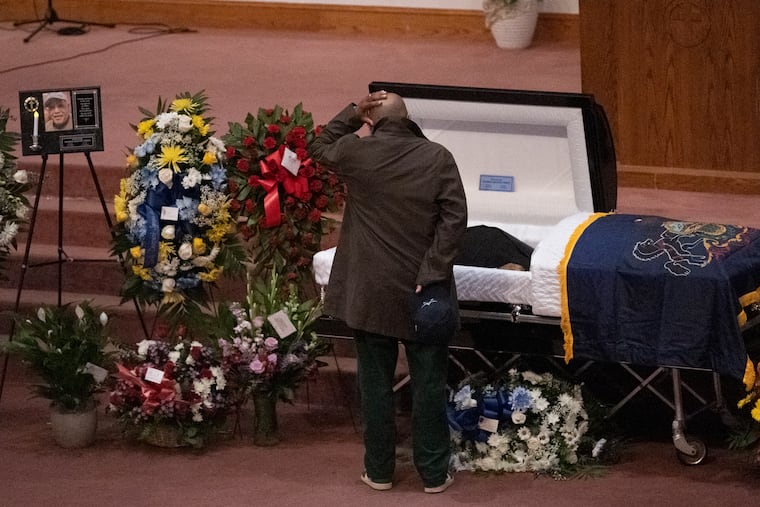A fighter throughout his life, T. Milton Street was laid to rest on Friday
“How do you say goodbye to your heroes?” State Sen. Sharif Street asked at the gathering that brought together family, friends and community members.

A steady stream of mourners braved the chilly drizzle on Friday to celebrate the life of former State Sen. T. Milton Street, a man alternately described as an activist, a civic gadfly, an entrepreneur, and a visionary.
Street, 83, died Nov. 28 after a five-year battle with cancer.
Reflections from a bevy of speakers recalled a man whose ideas were before their time, but whose tactics made him a civic troublemaker in his time.
Street “was a man who never backed down from an issue,” said former State Sen. Shirley Kitchen in a tribute video. Kitchen retired in 2016 after holding the same seat Street held, representing the Third district, which covers sections of North Philadelphia, the Lower Northeast, Germantown, and Roxborough.
» READ MORE: Watch the video tribute shown at Senator T. Milton Street Sr.’s funeral
“My father was not averse to trouble — any kind of trouble,” said Street’s daughter, Renee Street Toppin, bringing a chuckle of agreement from an otherwise solemn audience at Deliverance Evangelistic Church at 21st Street and Lehigh Avenue.
Street’s earliest bouts of public troublemaking came because of his entrepreneurial ambitions. He became outraged over the disparate legal treatment of the city’s street vendors, who were largely Black. He started a battle for recognition of street vending as a legitimate form of business instead of a nuisance to be quashed — a move that pitted him against the city’s political and business establishment.
“It takes vision to fight for things others can’t see.”
In 1975, City Council tried to pass legislation that would ban sidewalk vendors downtown. The Greater Philadelphia Chamber of Commerce said vendors were turning the city into “a trash heap” that would harm the tourism business. Street, along with his younger brother and business partner, John F. Street, joined with the Black Vendors’ Association and started the grassroots protesting that would become his trademark.
Bob Brady, chairman of the city’s Democratic Party, recalled that when he served as sergeant at arms for City Council in the 1970s, Street was chaining himself to Council’s doors and podiums as part of his protest theatrics.
“During the vendor bill [debate] I was sergeant at arms and I would carry him out,” Brady said. “Milton would whisper ‘slower, slower,’” to maximize his exposure to the television cameras.
Brady ended his remembrance with what he called his best Milton Street story. Street had been summoned to Traffic Court to handle his tickets. The court was crowded, and the proceedings, slow. Street, he said, grew impatient, jumped on the judge’s desk, said he was throwing the judge off the bench, and dismissed his own tickets.
As Street went from fighting for vendors to fighting for the homeless, his “proposed solutions” often angered bureaucrats and delighted a growing constituency of marginalized Philadelphians.
He brought the term “squatter” into popular usage as he encouraged the unhoused to cut the chains off of vacant properties, move in and repair them, said Asia Cooney, president of the Philadelphia Housing Authority Advisory Board. “I was one of the original squatters. He was fighting against injustice and the unequal application of the law.”
“If we choose not to advance that legacy, to do the work that he did with the passion he did it, we do it to our own disadvantage.”
The controversy of Street’s ideas, such as legalizing cannabis, and his antics, overshadowed the progress he made. He became nationally recognized for helping transform the nation’s housing policy in a way that promoted sweat equity by inviting low-income residents to help repair vacant units to live in, forestalling gentrification and displacement..
“It takes vision to fight for things others can’t see,” Street Toppin said.
Street’s son Kevin sought to remind mourners that his father, who had been in the limelight for almost five decades, was also a devoted father of three and grandfather of five.
Born April 25, 1939, on a farm near Norristown, Thomas Milton Street was only 21 when he was diagnosed with multiple sclerosis, and at one point, doctors predicted he would not be able to walk. Street defied conventional medical wisdom.
He would do it again at the end of his life when he was diagnosed with stage 4 cancer and was given five months to live. That was five years before he died.
Street’s brother, John, the former mayor, sang a hymn at the service in a booming voice. “I knew that this would turn into something very spiritual and emotional,” he told the audience. But he reminded them of the other side of his brother. “Having spent hours with my brother during the last days of his life, he was a fun guy,” he said. John Street said his brother was devoted to his mission, no matter the cost, and in the process became the progenitor of a political legacy.
For that, John Street credited his brother’s strong faith in God, which he nurtured from childhood as a Seventh-day Adventist. That faith, he said, made it difficult to convince Street that he couldn’t defeat the low expectations of teachers, the injustices in the political system, or illness.
“If we choose not to advance that legacy, to do the work that he did with the passion he did it, we do it to our own disadvantage,” John Street said in closing.
“How do you say goodbye to your heroes?” asked nephew Sharif Street, the Third District state senator. “He taught us not to be afraid. That we could fight back and we could survive.”